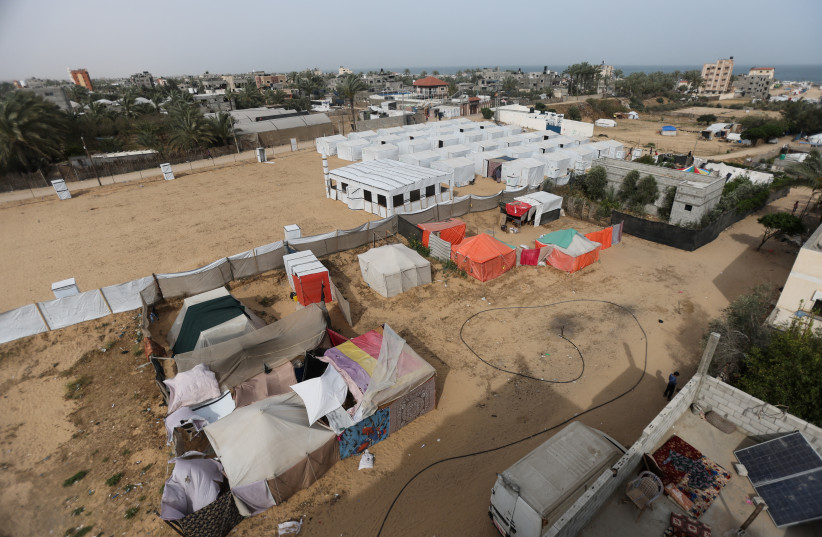Kuwait Emir visits Egypt, meets with leaders over Rafah concerns
Sheikh Meshaal Al-Ahmad Al-Jaber Al-Sabah, the Emir of Kuwait was in Cairo on Tuesday where he met with Egyptian President Abdel Fattah Al-Sisi. It was the Kuwaiti leader’s first official visit to Egypt after assuming his position as Emir.
Egypt invited the Emir for the visit. Egypt and Kuwait have positive ties and relations and there are an estimated 700,000 Egyptians living in Kuwait, the UAE-based Al-Ain media reports. In addition around 20,000 Kuwaitis study and live in Egypt.
Egypt and Kuwait are both concerned about a looming Israeli offensive into Rafah, the southern Gaza city controlled by Hamas on the Egyptian border. Kuwait generally has hostile views of Israel, more hostile than other Gulf states, whereas Egypt has peace with Israel. The two countries say they are worried about the “dire humanitarian consequences if Israel launches an attack on the city of Rafah in the southern Gaza Strip,” Al-Ain’s report says.
Concern over humanitarian situation in Gaza
The two countries issued a call for a ceasefire. These kinds of calls are pro-forma, a ritual in these kinds of state visits. The call for a ceasefire included calls for “facilitating safe, adequate and sustainable access for humanitarian aid to the Palestinian people in the occupied territory and implementing relevant Security Council resolutions.”
The countries discussed other issues as well. “In the final statement, the two sides stressed the necessity of establishing an international mechanism within the Gaza Strip to facilitate the entry of humanitarian aid into the Strip, stressing their rejection of Israel’s continuation of its military operations, including the possibility of its extension to the Palestinian city of Rafah, and warning of the dire humanitarian consequences that would result from such a step,” the report said.

Humanitarian aid is being increased to Gaza, via numerous new channels. There are air drops, there is aid coming from Jordan, there is aid that arrives from Egypt, there is support from the Gulf, France and other countries via Al-Arish in Egypt and also via Jordan; there is a new maritime corridor from Cyprus to Ashdod, there is a new northern entrance to the Gaza strip for aid, and the US is building a floating pier off the coast of Gaza.
Hundreds of trucks cross daily into Gaza. However, there is concern that an IDF operation in Rafah might disrupt some of this and also cause many Gazans to flee Rafah, an area they already fled to when leaving northern Gaza in October and November after the Hamas attack and massacre of October 7.
Egypt and Kuwait’s leaders said they were concerned that an operation in Rafah might lead to escalation or expand the conflict and risk stability in the region. “The two sides appreciated the close coordination on regional and international issues of common interest and stressed the need to give priority to the culture of peace, dialogue, and diplomatic settlement of disputes and differences in the Middle East region, in order to achieve development and peaceful coexistence among its countries, in a manner consistent with the values of tolerance, respect for the sovereignty of states over their territories, and non-interference in their affairs,” Al-Ain reported. Once again, this is a boilerplate statement and very common for these types of meetings.
Of interest, the two sides “stressed the importance of the security and stability of navigation in the region’s waterways in accordance with the provisions of international law and international conventions, including the United Nations Convention on the Law of the Sea of 1982, in order to guarantee the freedom and smoothness of navigation and provide security and stability therein.”
This is a clear reference to the Iran-backed Houthi attacks on ships in the Red Sea and Indian Ocean, attacks that harm trade that passes via the Red Sea and Suez and harms Egypt. As such it is clear that Egypt appears to be upping its rhetoric in this regard. Kuwait knows well the importance of free navigation of the seas because Iran, the large neighbor of Kuwait, has threatened shipping in the Gulf.
In addition, during the Iran-Iraq war, tankers had to be re-flagged during the so-called “Tanker war” in which Iran and Iraq attacked commercial vessels.
The US intervened in the tanker war to protect Kuwaiti tankers in 1986. The US carried out operations against Iran. Later, Iraq under Saddam Hussein invaded Kuwait, drawing the US into the Gulf War. That war set in motion much of the modern Middle East as we know it. For instance, the Scud threat to Israel led to the deployment of Patriots in Israel.
Palestinians, who backed Saddam’s invasion, were expelled from Kuwait after it was liberated. Osama Bin Laden claimed to be enraged about US forces stationed in Saudi Arabia and this led him increasingly toward anti-American extremism and the road to 9/11.
Egypt played a key role in the Gulf War. Under Hosni Mubarak, Egypt attempted to mediate the crisis in 1990 prior to Saddam’s invasion. Saddam betrayed Mubarak after a meeting in Jeddah where Egypt sought to broker peace via the Arab League. Egypt then joined the coalition to expel Saddam.





Comments are closed.